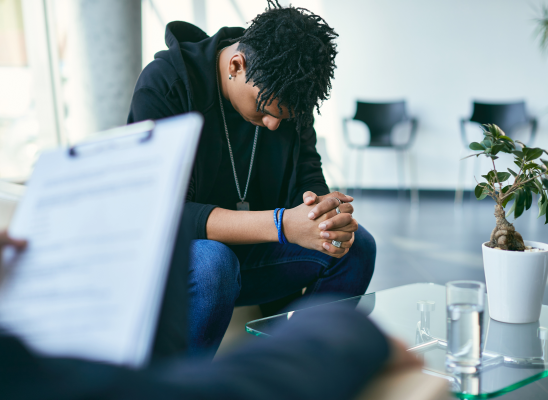Relapse in Skin Picking: Why It Happens and What to Do When It Does

Online test
Find out the severity of your symptoms with this free online test
Here’s the truth about recovery for just about any mental health disorder: contrary to what you might think, recovery is never a straight line. It’s more like a winding road with twists and turns you don’t always see coming. Relapses can and do happen, even when you’ve done everything right. In fact, relapse rates for mental disorders hover somewhere around 50%.
Skin picking is no different. While there are effective treatments for managing skin picking, it is a chronic disorder and relapses happen sometimes. By no means does this suggest that treatment is ineffective or pointless since relapse might happen anyway. Rather, it demonstrates that skin picking is a disorder that requires ongoing management, and extended periods of remission are possible.
Just why relapses happen isn’t always clear, but the good news is, there are things you can do. Understanding relapse and knowing what to do when triggers show up can help get you back on track and maybe even avoid a relapse.
Why Relapses Happen
Recovery is a learning process. While you’re working towards recovery, your brain is busy learning to recognize and manage symptoms and triggers so that you can deal with them. Learning takes time and often involves a good bit of trial and error to get to a place where you are able to manage your skin picking. There will be missteps. There may be times when a particular strategy isn’t helping. You may be unprepared for a certain situation. Or you may encounter a trigger you were previously not aware of. Or something else. The point is, even the best laid recovery plans are not foolproof.
Relapses can be triggered for lots of reasons and when you least expect it. Triggers can be internal (thoughts, feelings, sensations) or external (images, comments, surroundings).
Triggers can be anything that creates distress for you:
- Not enough sleep
- Stress
- Boredom
- Conflicts with a friend or loved one
- Uncomfortable or new situations
- Feeling anxious
- Something else
Part of managing skin picking is learning what your triggers are but even then, you might not discover every single one. Life is complicated and sometimes stuff just happens.
If you’re not sure what triggers your skin picking, a trigger log or journal can help you to track and better understand your triggers. You can even use a self-monitoring app if you find written logs to be inconvenient or difficult to use.
Working on triggers is also an important part of therapy. When you understand why, you can implement strategies to deal with the triggers that can lead to a relapse.
Have A Relapse Prevention Plan
Having tools and techniques at your disposal is a critical part of managing your skin picking. Triggers can pop up at any time. And you may also experience your picking in different ways at different times. For example, you may find that certain situations trigger a certain feeling while others don’t. You might find that a fidget works great in class but doesn’t help when you’re at home.
A smart tool for recovery is to have a relapse prevention plan. Think of it as a toolkit for managing those situations that can place your recovery at risk. Each time you’re able to handle your trigger without picking, you’re building skills and boosting resilience that can help you stay on track and potentially avoid a relapse.
What’s in a trigger toolkit?
Triggers can pop up anytime, anywhere. So, you want to have several options at your disposal that you can quickly implement. Here are some ideas for your toolkit:
- Distractions –Fidgets and fiddles, a game on your phone, or even holding a keychain that has a texture you like can distract you from the urge to pick and keep your hands engaged. Some people find textured items especially helpful.
- Writing – Journaling or using a trigger or thought tracker can help you focus and allow you to explore what’s happening. If writing helps you, keep an app or small notebook with you.
- Practice Mindfulness – Mindfulness exercises like deep breathing or relaxation strategies can help you sit with your thoughts and feelings without the need to act upon them. Practice grounding strategies. Relaxation apps (ex. Calm, Headspace, and others) can be helpful too.
- Move - Physical exercise can help expend some energy and shift your focus away from picking.
- Remove Yourself – Sometimes an environment can be triggering. If possible, move to another seat or even leave the room. Of course, sometimes that’s not possible so having other tools (like grounding or relaxation strategies) are helpful here. Social media falls here too. It can be quite triggering. Take a social media break if you need to.
- Reach out – If you’re struggling, reach out to your support system. Call a friend or trusted family member. Engage in online support groups. See your therapist. Making contact with someone you trust can help.
Even if you relapse, all is not lost. Use the skills you’ve learned to get back on track and give yourself grace. Reach out for help. Treatment can help you gain additional skills to help you manage your skin picking. Relapses happen but knowing what to do can help you get back on track and regain control of your journey.
References
1. Mukaromah, I. T., Anjani, F. F., Permatasari, N. P., Karyani, U., & Hasanah, M. (2019, April). Why Do People with Mental Disorders Relapse? [Paper presentation] 2nd International Seminar on Psychology 2019. https://digitallibrary.ump.ac.id/279/2/12.%20Full%20Paper_Mukaromah,%20Anjani,%20Permatasari,%20Karyani,%20Hasanah_UMS%20%28p%20123-132%29.pdf
2. Skinpick.com. (2021, February). Skin Picking: Identifying and Working with Triggers [Video]. YouTube. https://www.youtube.com/watch?v=4_w_0ecc500
Online test
Find out the severity of your symptoms with this free online test
Start your journey with SkinPick
Take control of your life and find freedom from skin picking through professional therapy and evidence-based behavioral techniques.
Start Now



